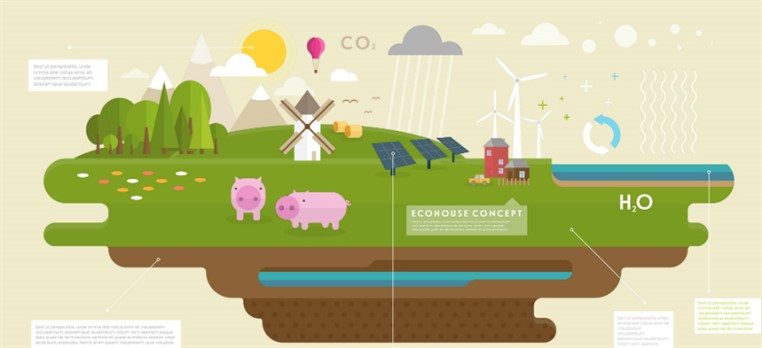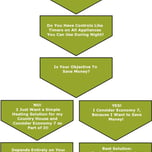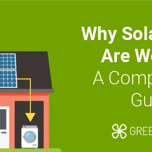Answer these simple questions and we will find you the BEST prices
Which type of solar quotes do you need?
It only takes 30 seconds
100% free with no obligation

Get up to 4 quotes by filling in only 1 quick form

Slash your energy bills by installing solar panels

For the average 2-3 bedroom house
- GreenMatch
- Blog
- Solar Farms in the UK
Solar Farms in the UK: October 2025 Guide
The most popular method of harvesting sunlight in order to create energy is solar farming, and it is quickly becoming one of the most preferred new investments for companies and independent investors.
In this article, we'll dive into the evolution of solar farms in the UK, their pros and cons, as well as the surrounding controversy.
But before that - if you're already curious about powering your home with solar energy, then our team at GreenMatch can help you find reliable solar panel installers.
We can send you up to 3 free no-obligation quotes from qualified installers in your area. This way, you don't have to research and contact installers yourself, saving you hours of your time. It also means you can easily select the best price. Click the button below to get started.
- Quotes from local engineers
- Payment by finance available
- Save up to £1,567 per year
It only takes 30 seconds



Solar Farms and their Evolution in the UK
Solar farms are large scale applications of solar photovoltaic (PV) systems, providing a source of safe, locally produced renewable energy for many years after construction.
The land used for a solar farm creates a safe place where nature and wildlife can flourish. The ground beneath the solar panels can also be used to graze animals or grow grass and wildflowers. Due to their large area occupation, solar farms are usually developed in rural locations.
In order to get approval for solar farms in the UK, a series of rigorous planning procedures must be passed, taking into account the suitability of the site, any potential impact on the locality (will the presence of solar farms harm or endanger the environment, taking into consideration ecological as well as socio-economic factors) and the relevant renewable energy targets.
Solar farms cover anything between 1 acre and 100 acres. The biggest solar farm in the UK is capable of powering 14,000 homes! It is located in Oxfordshire and has been connected to the national grid. The farm can produce a total of 46 MW of power.
Based on the average annual consumption of a household, for every 5 MW installed, a solar farm will power approximately 1,500 homes for a year. Approximately 25 acres of land is required for every 5 megawatts (MW) of installation.
It was predicted that in order to meet the EU renewable energy targets in 2020, the UK needed to increase their dependence on solar power. This ultimately resulted in creating investment and local green jobs, whilst reducing the reliance on overseas fossil fuel imports. As this valuable and rapidly deployable sector grows, solar energy will help businesses to manage their electricity costs while reducing their carbon emissions, and will provide a choice about where power can be obtained.
Pros and Cons of Solar Farms
Solar farms are a new apparition in the UK, but are growing in number as more and more companies invest in this renewable energy source. There are many solar energy advantages and disadvantages, but investing on a large scale can have different implications.
Like all previous energy sources, building solar farms has its positive aspects as well as negative aspects. Below are some pros and cons pertaining to solar farms:
Pros
- Solar farms generate electricity locally and feed into the local electricity grid using energy from the sun to generate electricity.
- They represent time-limited, reversible land use and provide an increased, diversified and stable source of income for landowners.
- There are no moving parts, so assembly and maintenance is minimal.
- There is no by-product or waste generated, except during manufacturing or dismantling.
- They have lower visual and environmental impacts than other forms of power generation.
- Renewables give the customer the choice of buying green electricity and reduce reliance on scarce fossil fuels.
Cons
- In order to produce enough energy for most power grids, solar farms need to use thousands of panels. This can take up a lot of land area and can potentially destroy wildlife and agricultural lands.
- When sunlight is limited due to excess shade or heavy cloud cover, this affects the amount of energy produced. In the UK, where the climate is ever so changing, this can be a big factor in solar panel efficiency.
- Public perception towards solar energy fields is that they are unattractive and can take away from the natural look of the land.
- Start-up solar farm costs are relatively high. However, there are many incentive programs to offset these costs such as government subsidies, which the UK governments granted for example to farmers willing to transform their lands into solar farms.

Solar farms are a technology providing a source of safe, locally produced, renewable energy for many years after construction. The land used for a solar farm creates a safe place where nature and wildlife can flourish. The ground beneath the panels can also be used to graze small sheep, goats or poultry, or grow grass and wildflowers.
Solar Farms Controversy in the UK
The presence of solar farms in the UK has been met with mixed feelings. One of the reasons for this is the fact that the farms are taking the space of the agricultural land, farmers investing in solar farms which are located on the land used previously for agriculture. More so, food and farming are the number one manufacturing industry in the UK, and some feel it is a real problem if productive agricultural land is converted into land for solar farm establishments. As a precaution, UK Government officials are cutting subsidies to farmers for solar farms in an effort to stop the rapid expansion of these on farmlands.
On the other hand, solar industry specialists argue that typically less than 5% of the land on which a farm is sited is taken up by fixings, leaving 95% available for other uses. They also disagree that solar farms are displacing food production, good practice in the industry now routinely combines solar with existing farming activities.
Furthermore, as the UK’s unpredictable weather creates greater crop risks, solar farms can help owners stabilise their incomes. For many UK farmers, incomes are very low, which risks the wider sustainability of the sector. Additionally, solar industry specialists argue that far from damaging the countryside, good solar farms are actually helping to protect the landscapes.
If you want to invest in domestic solar panel systems, then GreenMatch is here to help. Click the button below and we’ll send over up to 3 tailor-made quotes from trusted suppliers in your area. This service is without obligation, and also completely free of charge.
- Quotes from local engineers
- Payment by finance available
- Save up to £1,567 per year
It only takes 30 seconds



We strive to connect our customers with the right product and supplier. Would you like to be part of GreenMatch?




